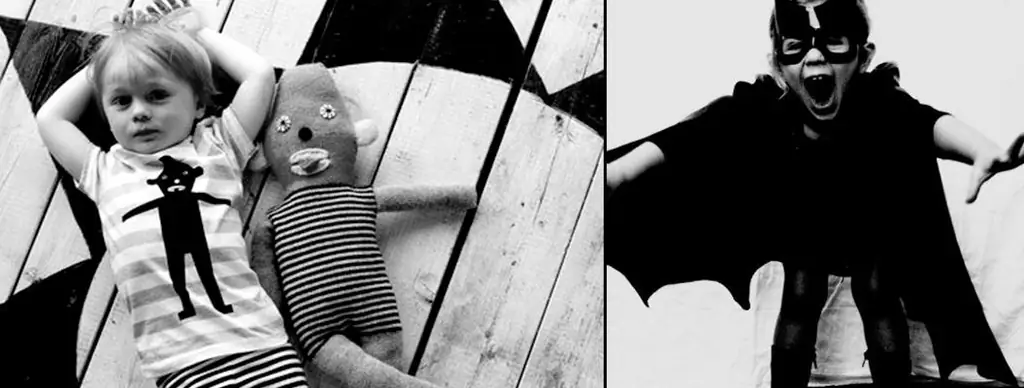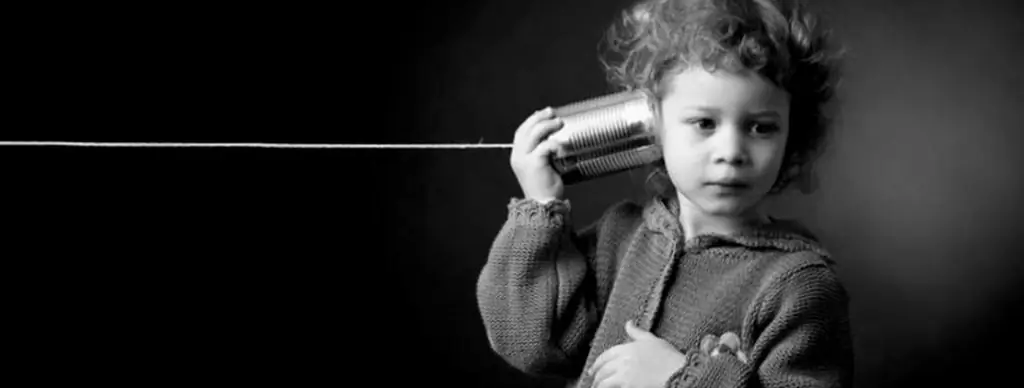- Author Adrian Jeff jeff@psychologosportal.com.
- Public 2023-12-17 05:06.
- Last modified 2025-01-24 14:09.

Is a hyperactive child a non-existent diagnosis or a real problem?
A child under one year old broke his crib? In a year climbed to the ceiling on the handles on the sideboard? Does it behave like a perpetual motion machine? A hyperactive kid or just such an active kid? Where are the boundaries of the norm and how not to miss the pathology? We will figure it out with the help of the recommendations of doctors, teachers and system-vector psychologists
"Calm, only calm" - this is the motto that parents of an overly nimble kid usually live under.
If the child:
- not able to sit in one place for a minute, all the time running somewhere, starting to do something and immediately throwing it;
- suffers from attention deficit - cannot concentrate on any activity that is even interesting to him;
- does not "hear" the words addressed to him, ignores the prohibitions of adults,
- then these manifestations, naturally, make parents worry.
A hyperactive child? Or just such an active kid? Where are the boundaries of the norm and how not to miss the pathology? Maybe the child needs the help of specialists?
We will figure it out with the help of the recommendations of doctors, teachers and system-vector psychologists.
Hyperactivity syndrome - medical opinion
Attention deficit hyperactivity disorder (ADHD) is a neurological-behavioral developmental disorder that begins in childhood.
ADHD symptoms: the child is hyperactive, inattentive, impulsive.
There is a list of the manifestations of these symptoms in a child according to the International Classification of Diseases (ICD-10) and the American Classification of Mental Pathologies (DSM-V).
| Attention deficit | Hyperactivity and impulsivity |
| Loses things often | Makes impulsive movements with arms or legs |
| Avoids tasks that require mental strain | Can't wait in line |
| Forgetful child | Interferes with the conversation or activities of others |
| Frequently switches from one activity to another | Answers before the question was finished |
| Can't complete the task to the end | Makes noisy antics, shouts |
| Not listening | Can't play quietly, calmly |
| Does not follow instructions, does not work independently | Acts as if "wound up" |
| Easily distracted | Runs too much |
| Gets up often |
If there are at least 6 out of 9 manifestations observed in different social environments (home, classroom, section) for at least 6 months, doctors suspect the child has attention deficit hyperactivity disorder.
Hyperactivity syndrome - the opinion of teachers
We showed this list to kindergarten teachers and primary school teachers. They noted that at least 20% of all children aged 2-3 years (upon entering kindergarten) and about 15% of children aged 6-8 years (upon entering school) have some of these symptoms.
The most common characteristics were the following:
- the baby is more active than other children;
- the child is impatient, may jump up, shout an answer in class or in kindergarten;
- makes restless movements with his hands and / or legs (for example: drumming with his fingers, tapping with his foot);
- cannot sit quietly in one place, turns, turns, fidgets, wriggles;
- is in constant motion, climbs somewhere, climbs, runs, jumps;
- the child is noisy and talkative, cannot play quietly and calmly.
Does this mean that hyperactivity syndrome occurs in every fifth child?

Difficulty in making a diagnosis
- Before talking about the syndrome of hyperactivity in a child, doctors suggest that first make sure that impulsivity, excessive activity and distraction are not a child's reaction to a difficult life situation in the family, kindergarten, school (moving, family troubles, conflicts). However, in modern life it is difficult to "place" a child in an ideal situation to say that the symptoms have nothing to do with the influence of traumatic factors.
- There are no laboratory and radiological tests to confirm this disease.
- Criteria for diagnosing hyperactivity disorder are not clear enough and often change.
The treatment offered to a hyperactive child is long-term and not always effective; a 100% cure is impossible.
All this complicates diagnosis and casts doubt on the need for medical intervention for hyperactivity syndrome.
Some doctors (including psychiatrists), psychologists, teachers, parents consider attention deficit hyperactivity disorder (ADHD) to be a non-existent disease (among them world-renowned experts - Thomas Sasz, Michel Foucault).
The UN Committee on the Rights of the Child even issued recommendations in which it expressed concern about the misdiagnosis of attention deficit hyperactivity disorder (ADHD) and attention deficit disorder (ADD).
So, not all doctors are 100% sure of the need to prescribe treatment for a hyperactive child.
Many doctors, psychologists, teachers are inclined to believe that if the child does not have organic disorders of the central nervous system (CNS), then the manifestations of hyperactivity syndrome can be dealt with with non-drug methods.
| Correction ways | Responsible for helping the child |
| Psychocorrectional work | Psychologist |
| Correctional pedagogy | Dhow educator, school teacher |
| Improving the microclimate in the child's family | Parents |
| Proper parenting | Parents |
Of great importance in correcting the behavior of a child with signs of hyperactivity syndrome is the well-being of the child in the family and his proper upbringing.

Parents can create conditions for the development of the child, teach him to use his energy in the right direction. To do this, you need to understand the features of the psyche of a hyperactive child. This knowledge is given at the training "System-vector psychology" by Yuri Burlan.
We will show the main points that parents just need to know about their smart child.
A hyperactive child - why is he like that?
Most often, parents see signs of hyperactivity syndrome in a child with a skin vector. He naturally possesses great potential for flexibility, dexterity, speed - both in body and mind.
A child under one year old broke his crib? In a year climbed to the ceiling on the handles on the sideboard? Does it behave like a perpetual motion machine? Everything is enough, climbs everywhere, moves exclusively by running, forcing parents to be constantly on the alert, and grandmothers to drink sedatives?
Is this a hyperactive child? This is a toddler with a skin vector. Such properties are necessary for him to grow up as an engineer, leader, organizer, inventor, athlete, entrepreneur.
This child, with proper development, will be able to easily earn money in the future, manage a team, will be able to benefit society with his engineering talent and logical thinking.
About 24% of children are born with a cutaneous vector, and it is important for us adults to be able to distinguish the natural properties of a child from hyperactivity disorder.
Read the advice of a system-vector psychologist on raising a child with a skin vector here.
A hyperactive child “does not hear” his parents. Why?
Most often, a child is suspected of attention deficit hyperactivity disorder if he also has a sound vector in combination with the skin vector.
From birth, a sound child has inherent abilities and tendencies to concentrate, listen, and search for meaning.
A psycho-traumatic situation for him is loud sounds and offensive words. If the parents do not get along with each other and / or swear at the child, if the sound ecology regime is not observed in the house and the baby does not have the opportunity to be in silence, then the psyche seeks to protect sensitive ears. And the child “withdraws into himself”, not finding outside the necessary peace and longed for silence.

And for the parents it looks as if the child does not hear them: “he understands only from the twentieth time,” “does not react to my words,” “all in himself”. There may be a problem in communicating with other people, peers, teachers. The more you raise your voice to the child, trying to shout to him, the more the problem worsens.
At the same time, the child looks hyperactive (in the skin vector) and unable to concentrate, hold attention (in the sound vector). Then they talk about attention deficit hyperactivity disorder.
Read about the features of upbringing and teaching a baby with a sound vector here.
Ungovernable! Not just a hyperactive child
Leaders, presidents, generals, outstanding personalities (poets, actors, musicians, public figures) - these people with their charisma captivate hundreds, thousands, sometimes millions of people. They follow, they are trusted, they are equal. And they, in turn, are ready to give their lives for their people, their collective.
Do you think Peter the Great or Vladimir Vysotsky were obedient children? Hyperactivity syndrome is the mildest diagnosis that modern doctors could make.
A child with an urethral vector is born to become a leader. You are very lucky if you are his parents. Less than 5% of such children are born.
The urethral child gives the impression of being hyperactive. He does not perceive prohibitions and instructions, because his natural properties are to be the main one, above everyone in the hierarchy. If his parents recognize this right, they channel his unprecedented energy into responsibility for everyone around him.
The position of the parents as regents under the little tsar: "help, please, we cannot cope without you!" - removes protest behavior, perceived as a syndrome of hyperactivity and attention deficit.
This is not a hyperactive child, his innate quality is courage, justice! With the right upbringing, he will never abandon his comrades in trouble, help the needy, intercede for the weak. The exploits and achievements of the urethral people remain in the heroic heritage of the country.
Read about how to educate the urethral vector of a child here.
A hyperactive child - what should an adult do?
Good parents always worry about their children if their behavior differs from the accepted norms in society. The reason for the excitement is a lack of understanding of what the baby really needs.

It happens that a child with hyperactivity disorder really needs medical help. But in the overwhelming majority of cases, the “symptoms” of ADHD hide the natural characteristics of the child, which allow him to develop in the right direction, ensuring his happy and successful future. And it is extremely dangerous to "treat", to suppress these manifestations.
Understanding the reasons for the behavior of a hyperactive child, the characteristics of his psyche, gives parents the opportunity to find effective methods of upbringing, to choose the right training program. Often this is enough to relieve the child of the manifestations defined as hyperactivity disorder.
This is work not only within the family - educators, teachers, coaches must understand the characteristics of the baby.
Parents are responsible for their child. Sometimes it is enough to transfer him to a group with another teacher (for example, with a skin vector, like his), and questions about the hyperactivity syndrome are removed. By the equality of properties, the teacher will understand the baby and not demand the impossible from the child.
Basic recommendations for parents of a hyperactive child:
1. Any child should grow up in a safe and secure situation. He should feel that you love him, you know. It is important that the parents themselves are in a balanced state, that is, they do not experience fears, depression and other bad conditions.
2. It is categorically impossible to beat, shout, insult the child - this will only aggravate the manifestations of the hyperactivity syndrome and lead to delays in the child's mental development.
Parents who have completed the training "System-Vector Psychology" have already found answers to all their questions about raising children.
They know why discipline and restrictions, adherence to the daily routine are important for a child with a skin vector. They can choose the kind of sport that suits the baby and exercises that develop his logical thinking. They understand that a construction set is the best toy for their child. They know how to competently motivate a son or daughter to study and good behavior.
Parents of a child with a sound vector understand how to raise a genius. They do not doubt the need to practice music and the even greater need to provide the child with silence. A map of the starry sky and physical and mathematical problems replace toys and entertainment for a small sound player.

Parents of a baby with a urethral vector cease to see him as a hyperactive child. They understand what a miracle is growing in their family, and they bring up a person whose value for society is difficult to overestimate.
Yuri Burlan's training "System Vector Psychology" will allow you to get to know your child and understand the intricacies of his upbringing. Instead of manifestations of hyperactivity syndrome, you will see the real features and capabilities of your loved one.
Read the reviews of people who have already succeeded:






